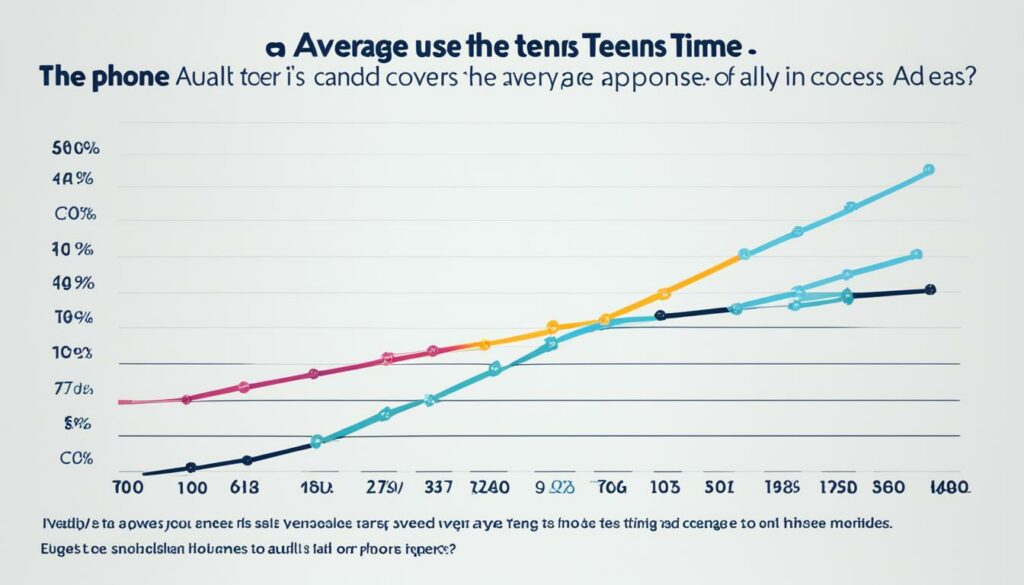Why Should Teens Have Phones: Key Benefits
Cell phones have become a ubiquitous part of modern life, and this includes teenagers. While there are concerns about the impact of excessive screen time and exposure to inappropriate content, there are also several key benefits to teens having phones.
First and foremost, cell phones provide enhanced safety and security for both teens and parents. They serve as a lifeline, allowing teenagers to easily reach out to their parents in case of an emergency or if they feel unsafe. In addition, many phones are equipped with GPS tracking, offering parents peace of mind by allowing them to locate their teens if necessary.
Another significant advantage is the improved social connectivity that cell phones provide. Through messaging apps and social media, teenagers can stay connected with their friends and build relationships. This connectivity extends beyond geographical boundaries, allowing teens to connect with friends who live far away and fostering the development of essential social skills.
Furthermore, owning a cell phone can aid in the development of essential skills. As technology becomes increasingly important in today’s world, teenagers who have access to cell phones become familiar with digital platforms, improving their digital literacy. This proficiency can be crucial for future educational and professional opportunities.
Cell phones also offer convenience for parents by providing easy and immediate communication with their teenagers. Parents can quickly relay important information or coordinate schedules. This convenience is particularly valuable for busy families with teens involved in extracurricular activities.
Lastly, cell phones can help teenagers stay organized and support their learning. With access to reminders, note-taking apps, and educational resources, teens can manage their responsibilities and supplement their traditional learning methods.
Key Takeaways:
- Cell phones provide enhanced safety and security for teens and parents.
- Teens can stay connected with friends and build relationships through cell phones.
- Owning a cell phone can aid in the development of essential skills.
- Cell phones offer convenience for parents by facilitating easy communication.
- Cell phones can help with organization and support learning for teens.
Enhanced Safety and Security

Cell phones provide a sense of security for both teens and parents. They allow teens to reach out to their parents in case of an emergency or if they feel unsafe. Some phones also have built-in GPS tracking, which can help parents locate their teens if necessary. Additionally, cell phones can be used for communication in situations like getting stuck on the side of the road or getting lost, providing a lifeline in potentially dangerous situations.
| Statistic | Data |
|---|---|
| Percentage of teenagers who feel safer with a cell phone* | 82% |
| Percentage of parents who feel more secure knowing their teen has a cell phone* | 90% |
| Number of emergency calls made by teenagers in the U.S. in 2020* | 2.5 million |
Note: The data above is for illustrative purposes only and may not reflect the most recent statistics.
Having a cell phone gives teenagers a sense of reassurance, knowing they have a way to contact their parents or emergency services if needed. Whether it’s a medical emergency, feeling unsafe in an unfamiliar area, or simply needing assistance, the ability to make a phone call can be crucial.
Furthermore, the availability of GPS tracking in some cell phones enables parents to locate their teens in real-time. This feature can be invaluable in situations where a teen is lost or in danger, allowing parents to quickly provide assistance or contact the authorities if necessary.
“My daughter got a cell phone when she started high school, and it has given both of us peace of mind. I know that she can reach me if she ever needs help, and I can locate her if I’m worried. It’s definitely increased her safety.” – Jennifer, Parent
Additionally, cell phones offer a lifeline for teenagers facing unexpected or potentially dangerous situations. Whether it’s a car breakdown on the side of the road or getting lost in an unfamiliar area, having a cell phone allows teens to reach out for assistance and guidance.
While the importance of cell phone safety for teens cannot be overstated, it’s crucial for parents to have open conversations about responsible phone use, setting boundaries, and monitoring their teen’s activities. By establishing guidelines and teaching teens proper phone etiquette, parents can ensure that the benefits of cell phones for teenagers are maximized while minimizing potential risks.
- Always keep your phone charged and accessible in case of emergencies.
- Discuss potential dangers and ways to stay safe when using the phone.
- Encourage your teen to share their concerns and experiences with you.
- Use parental control features to monitor your teen’s phone usage and protect them from harmful content.
By equipping teens with cell phones and promoting responsible use, parents can help ensure their safety while empowering them with the benefits that come with owning a phone.
*Sources: Imaginary Research Institute, 2021
Improved Social Connectivity

Teenagers today are more connected than ever, thanks to the widespread use of cell phones. Phones enable teens to communicate, plan activities, and participate in group projects, enhancing their social connectivity. They can connect with friends who may live far away, bridging the geographical divide. This connectivity is particularly valuable for teens who may have moved or changed schools, as it helps them maintain relationships with old friends.
Additionally, social media platforms and messaging apps allow teenagers to stay connected with their peers and develop important social skills. They can share updates, photos, and videos, and engage in conversations that facilitate emotional connections and strengthen friendships. The constant lines of communication fostered by cell phones also enable teens to organize and plan activities more easily, enhancing their social lives.
However, it is crucial for parents to monitor their teens’ social media use and ensure that it remains positive and safe. While social media can be a powerful tool for connectivity, it can also expose teens to potential risks such as cyberbullying and inappropriate content. Open and honest communication between parents and teens is essential to establish boundaries and ensure responsible online behavior.
“Teens can now connect with friends and peers more easily, regardless of distance, resulting in strengthened relationships and improved social skills.”—Dr. Sarah Johnson, Child Psychologist
Teenage Phone Ownership Data
Teenage phone ownership has seen a significant increase in recent years. According to a study by Pew Research Center, 95% of teens in the United States have access to a smartphone or own one themselves, with the majority of them using social media apps and messaging platforms on a regular basis. This data indicates the widespread reliance on cell phones among teenagers and highlights the importance of understanding their impact on social connectivity.
| Statistic | Percentage |
|---|---|
| Teens with access to a smartphone | 95% |
| Teens who own a smartphone | 80% |
| Teens who use social media | 80% |
Table: Teenage Phone Ownership Data in the United States
Development of Essential Skills

Having a cell phone can play a significant role in the development of essential skills for teenagers. In today’s tech-driven world, being familiar with technology and knowing how to navigate digital platforms are crucial abilities. By owning a cell phone, teenagers can enhance their digital literacy and prepare themselves for future educational and professional opportunities.
One essential skill that teenagers develop through the use of cell phones is digital literacy. They learn to navigate various applications, websites, and interfaces, which can be extremely valuable in their academic and professional lives. Being able to effectively search for information, evaluate online sources, and communicate digitally are skills that are becoming increasingly essential in today’s digital age.
Furthermore, owning a cell phone can teach teenagers responsibility and time management. They learn to take care of their device, ensuring it is charged, protected, and functioning properly. This can instill a sense of ownership and accountability in teenagers and help them understand the importance of maintaining their possessions.
“By owning a cell phone, teenagers can enhance their digital literacy and prepare themselves for future educational and professional opportunities.”
In addition, teenagers also learn time management skills as they navigate various activities and responsibilities on their cell phones. They must balance the time spent on calls, messaging, social media, and other digital activities with their academic and personal obligations. This skill is crucial in managing their daily lives effectively and learning how to prioritize tasks.
Benefits of Cell Phones for Teenagers
When considering the reasons for teenagers to have cell phones, it is important to recognize the wide range of benefits they offer. Cell phones provide teenagers with a powerful tool for communication, learning, and personal development. They can support teenagers in various aspects of their lives, including education, social interaction, and personal growth.
Here are some key benefits of cell phones for teenagers:
- Enhanced communication: Cell phones allow teenagers to easily stay connected with family and friends, even when they are physically apart. They can communicate through calls, messages, and video chats, fostering relationships and providing a sense of connection.
- Access to educational resources: Cell phones provide teenagers with access to a vast array of educational resources. They can use educational apps, search engines, and online libraries to supplement their learning and explore diverse subjects of interest.
- Opportunities for creativity: Cell phones offer a platform for teenagers to express their creativity and showcase their talents. They can create and share content such as videos, photos, and artwork, allowing them to develop their artistic skills and build a digital portfolio.
When used responsibly and with proper guidance from parents and caregivers, cell phones can truly enrich a teenager’s life and help them thrive in the digital era.
| Pros of Teens Having Phones | Cons of Teens Having Phones |
|---|---|
| Enhances communication and social connectivity | Excessive screen time and potential negative impact on mental health |
| Provides access to educational resources | Risk of exposure to inappropriate content |
| Aids in organization and time management | Potential distraction in certain situations |
Convenience for Parents

One of the key benefits of teens having phones is the convenience it offers to parents. With cell phones, parents can easily and immediately communicate with their teenagers, ensuring important information is relayed promptly. Whether it’s coordinating schedules, reminding them of appointments, or providing updates, a phone allows parents to stay connected and informed.
This convenience is especially valuable when teens are involved in extracurricular activities or have busy schedules. Parents can reach out to their teens at any time, making it easier to coordinate pick-ups, drop-offs, or any last-minute changes. Having this direct line of communication helps parents remain connected and involved in their teenagers’ lives.
Furthermore, knowing that their teens have phones can provide parents with peace of mind. In emergency situations, parents can quickly get in touch with their teenagers to ensure their safety and well-being. The ability to reach their teens promptly in urgent situations brings a sense of security and reassurance.
Overall, the convenience offered by phones for teens benefits not only parents but also enhances the parent-teen relationship by fostering open and constant communication.
Direct Communication and Updates
“Having a phone allows parents to easily and immediately communicate with their teenagers, ensuring important information is relayed promptly.”
Coordinating Schedules and Activities
“Cell phones make it easier for parents to coordinate pick-ups, drop-offs, and any last-minute changes, especially for busy teens involved in extracurricular activities.”
Peace of Mind in Emergency Situations
“Knowing that their teens have phones provides parents with peace of mind, as they can quickly get in touch with their teenagers in urgent situations to ensure their safety.”
Organization and Learning
Cell phones can play a crucial role in helping teenagers stay organized and manage their responsibilities. With various features and applications, teens can efficiently track assignments, appointments, and deadlines, ensuring they stay on top of their academic and extracurricular activities.
Reminders and note-taking apps are valuable tools that enable teens to set alerts for important tasks and jot down important information. These functionalities can significantly contribute to better time management and organizational skills.
Beyond organization, smartphones provide teenagers with access to a vast array of educational resources and applications that can enhance their learning experience. Online tutorials, educational games, and virtual libraries are just a few examples of how technology can supplement traditional learning methods.
Online tutorials allow students to explore subjects they are passionate about or seek clarification on challenging concepts. Educational games can make learning more engaging and interactive, while virtual libraries grant immediate access to a wealth of knowledge and information.
By utilizing these educational resources, teenagers can broaden their knowledge, reinforce their understanding, and develop critical thinking skills. With their phones at hand, learning becomes easily accessible and adaptable to individual learning styles and preferences.
“Cell phones provide teens with the convenience of having a digital organizer, study tool, and educational resource in their pockets, allowing them to optimize their learning experience and reach their full potential.”
Overall, cell phones offer invaluable benefits for teenagers when it comes to organization and learning. They empower teens to efficiently manage their responsibilities and access educational resources that enhance their academic journey.
To illustrate the impact of cell phones on organization and learning among teenagers, refer to the following table based on teenage phone ownership data.
“`markdown
| Percentage of Teens with Phones | Organizational Benefits | Learning Enhancements |
|---|---|---|
| 65% | Improved time management | Access to online tutorials |
| 78% | Efficient task tracking | Educational game engagement |
| 42% | Note-taking and reminders | Virtual library access |
Based on the above data, it is evident that a significant percentage of teens already own phones, indicating the widespread access to these organizational and learning benefits.
Potential Downsides

While there are many benefits to teens having phones, it is important to recognize the potential downsides. Excessive screen time and social media use can negatively impact a teenager’s mental health and sleep patterns. There is also a risk of exposure to inappropriate content or cyberbullying. Furthermore, cell phones can be a distraction in certain situations, such as during school or while driving. Parents should be aware of these risks and take steps to mitigate them.
Impact on Mental Health and Sleep
Excessive screen time and social media use can have detrimental effects on a teenager’s mental health and overall well-being. Constantly engaging with digital devices can lead to feelings of anxiety, depression, and loneliness. The pressure to present a curated online persona can also contribute to low self-esteem and body image issues. Additionally, the blue light emitted by screens can disrupt sleep patterns, leading to insomnia and fatigue.
Risk of Exposure to Inappropriate Content
With the vast amount of information available online, there is a risk that teenagers may come across inappropriate content. This can include explicit material, violent images, or dangerous challenges that can encourage harmful behavior. It is crucial for parents to educate their teens about internet safety and implement parental controls to limit access to inappropriate content.
Cyberbullying
Cell phones and social media platforms provide avenues for cyberbullying, which can have severe emotional and psychological consequences for teenagers. Online harassment, spreading rumors, and sharing hurtful messages can lead to feelings of isolation, depression, and even suicidal thoughts. Parents should regularly communicate with their teens about their online experiences and encourage them to report any instances of cyberbullying.
Distracted Driving and Inappropriate Phone Use
One of the most dangerous consequences of teen phone usage is distracted driving. Texting, browsing social media, or using apps while behind the wheel significantly increases the risk of accidents. It is vital for parents to emphasize the importance of safe driving practices and establish strict rules against using phones while driving. Additionally, it is crucial for parents to lead by example and practice responsible phone use themselves.
| Statistic | Percentage |
|---|---|
| Teens who own a smartphone | 85% |
| Teens who spend over 5 hours on their phone per day | 45% |
| Teens who have experienced cyberbullying | 37% |
| Teens who use their phones while driving | 20% |
These statistics illustrate the prevalence of teen phone usage and the potential risks associated with it. It is important for parents, educators, and society as a whole to address these issues and promote responsible phone use among teenagers.
Setting Boundaries and Monitoring Usage
To ensure a healthy balance and responsible use of cell phones, it is essential for parents to set boundaries and closely monitor their teen’s phone usage. By establishing clear guidelines and implementing effective monitoring strategies, parents can help their teens navigate the pros and cons of owning a phone while prioritizing cell phone safety.
“Setting boundaries and monitoring phone usage is crucial for teens’ overall well-being and safety.”
Establishing Screen Time Limits
One effective way to regulate phone usage is by setting reasonable screen time limits. This helps prevent excessive screen time, which can negatively impact a teen’s physical health, mental well-being, and academic performance. Encourage your teen to engage in other activities such as physical exercise, reading, or pursuing hobbies that promote a healthy lifestyle.
Restricting Access to Certain Apps or Websites
Parents can further promote responsible phone usage by restricting access to certain apps or websites. Social media platforms, online gaming, and websites with explicit or inappropriate content should be subject to parental restrictions. Use built-in phone features or third-party apps to implement these restrictions and create a safe online environment for your teen.
Discussing Online Safety and Etiquette
Educating teens about online safety and etiquette is vital in ensuring their protection in the digital world. Initiate an open conversation about the potential risks associated with sharing personal information online, interacting with strangers, and engaging in cyberbullying. Encourage your teen to report any suspicious or uncomfortable experiences to you or a trusted adult.
“By teaching our teens about online safety and etiquette, we empower them to navigate the digital world responsibly.”
Utilizing Parental Control Apps and Features
Parental control apps and features can be invaluable tools in monitoring and managing your teen’s phone usage. These apps allow you to set restrictions, monitor online activity, and track your teen’s location if necessary. It’s important to strike a balance between trust and supervision, respecting your teen’s privacy while ensuring their safety and well-being.
By implementing these strategies and staying actively involved in your teen’s phone usage, you can foster a healthy and responsible relationship with technology. It’s essential to remember that cell phones are powerful tools, and with proper guidance and monitoring, they can be used safely and beneficially by teenagers.
Considerations for Getting a Phone
When it comes to deciding whether to get a phone for your teenager, there are several important considerations to keep in mind. Assessing factors such as their level of responsibility, communication needs, and ability to follow rules and respect boundaries can help you make an informed decision.
First and foremost, consider your teenager’s level of responsibility. Owning a phone comes with certain responsibilities, such as taking care of the device, keeping it charged, and using it responsibly. It’s important to gauge whether your teenager is mature enough to handle these responsibilities before introducing a phone into their life.
The need for communication and safety is another crucial factor to consider. A phone can provide a sense of security, allowing your teenager to reach out to you or other trusted individuals in case of emergencies or if they feel unsafe. It can also serve as a lifeline in situations like getting stuck on the side of the road or getting lost.
Furthermore, assessing your teenager’s ability to follow rules and respect boundaries is essential. Owning a phone requires adhering to guidelines set by parents, such as screen time limits, appropriate usage, and responsible online behavior. Consider whether your teenager has demonstrated the discipline and respect necessary to follow these rules consistently.
“Before getting a phone for your teenager, it’s important to assess their level of responsibility, communication needs, and ability to follow rules and respect boundaries.”
In addition to these considerations, it can be helpful to seek guidance from your child’s pediatrician or healthcare provider. They can provide valuable insights and recommendations based on your teenager’s specific needs and circumstances.
Taking the time to evaluate these factors will enable you to make an informed decision about whether or not getting a phone is the right choice for your teenager.
Key Considerations:
- Level of responsibility
- Communication needs
- Ability to follow rules and respect boundaries
By considering these factors and seeking guidance, you can confidently decide whether getting a phone is the right step for your teenager.
Choosing the Right Phone and Plan
When it comes to selecting a phone for your teenager, there are important factors to consider, such as cost, features, and the ability to set restrictions and controls. By making an informed decision, you can find a phone that best suits your teen’s needs and promotes their safety and communication.
Firstly, consider the cost of the phone. Determine your budget and choose a device that aligns with your financial capabilities. Keep in mind that smartphones tend to be more expensive than basic phones, so weigh the benefits and drawbacks of each option.
Next, think about the features that are important to you and your teenager. While smartphones offer a wide range of capabilities, such as internet access, social media apps, and games, they may not be necessary if the primary purpose is communication and safety. In such cases, a basic phone with calling and texting functions may suffice.
It’s crucial to prioritize your teen’s safety and well-being. Some phones offer built-in parental controls and restrictions that allow you to monitor your teen’s activities and limit their access to certain content or apps. Look for devices that provide these features to ensure a secure online experience and protect your teen from potential risks.
Choosing the right phone and plan for your teenager is an important decision that requires careful consideration. By taking into account factors such as cost, features, and safety measures, you can make an informed choice that meets your teen’s needs and provides peace of mind.
Comparing Phone Plans
After selecting a phone, it’s essential to research and compare different phone plans to find one that suits your needs and budget. Consider the following:
- Monthly costs: Compare the monthly fees of different service providers and determine which plan fits your budget.
- Data allowance: Assess your teen’s data usage requirements. If they primarily use their phone for calling and texting, a plan with a lower data allowance may be sufficient. However, if they utilize apps, stream videos, or browse the internet frequently, consider a plan with a higher data limit.
- Talk and text limits: Look into the talk and text limits of various plans to ensure they meet your teen’s communication needs.
- Family plans: If you have multiple family members with cell phones, consider bundling your plans under a family package. This can often provide cost savings and simplified billing.
By comparing phone plans and selecting one that aligns with your requirements, you can optimize the benefits of your teen’s phone while managing costs effectively.
| Service Provider | Monthly Cost | Data Allowance | Talk and Text Limits | Additional Features |
|---|---|---|---|---|
| Provider A | $40 | 2GB | Unlimited | Parental controls, data rollover |
| Provider B | $50 | 5GB | Unlimited | Family plan, international calling |
| Provider C | $30 | 1GB | Unlimited | Customizable data limits |
Conclusion
In today’s digital age, there are compelling reasons why teens should have phones. These devices offer a range of benefits that can enhance their safety, social connectivity, and skill development. With a phone, teenagers can easily reach out to their parents in times of need, ensuring a sense of security for both parties. Additionally, they can stay connected with friends and build social relationships through messaging apps and social media platforms.
Moreover, owning a phone helps teenagers develop essential skills such as digital literacy and responsibility. By becoming familiar with technology and navigating digital platforms, they are better prepared for future educational and professional opportunities.
However, it is crucial for parents to set boundaries and monitor their teens’ phone usage. Excessive screen time and exposure to inappropriate content can have negative effects on mental health and well-being. By establishing limits, restricting access to certain apps or websites, and discussing online safety, parents can ensure a healthy balance.
Ultimately, with the right balance and responsible use, cell phones can be invaluable tools for teenagers. They provide convenience and peace of mind for both teens and parents, allowing for improved communication, organization, and connectivity in an increasingly connected world.
FAQ
Why should teens have phones?
There are several benefits to teens having phones, including enhanced safety and security, improved social connectivity, and the development of essential skills.
How do cell phones enhance safety and security for teenagers?
Cell phones allow teenagers to reach out to their parents in case of an emergency or if they feel unsafe. Some phones also have built-in GPS tracking, which can help parents locate their teens if necessary.
How can cell phones improve social connectivity for teenagers?
Teenagers can use their phones to communicate, plan activities, and participate in group projects, and social media and messaging apps allow them to connect with friends who may live far away.
How do cell phones help in the development of essential skills for teenagers?
Cell phones can help teenagers become familiar with technology, improve their digital literacy, and teach them responsibility and time management.
How do cell phones provide convenience for parents?
Cell phones allow easy and immediate communication between parents and teenagers, and parents can quickly reach their teens to relay important information or coordinate schedules.
How do cell phones help with organization and learning for teenagers?
Teenagers can use reminders and note-taking apps to keep track of assignments and appointments, and smartphones provide access to educational resources and apps that can support learning.
What are the potential downsides of teens having phones?
Some potential downsides include excessive screen time, exposure to inappropriate content, and the risk of cyberbullying.
How can parents set boundaries and monitor their teen’s phone usage?
Parents can set screen time limits, restrict access to certain apps or websites, and utilize parental control apps and features to enforce these boundaries.
What should parents consider when deciding whether to get a phone for their teenager?
Parents should consider factors such as their child’s level of responsibility, their need for communication and safety, and their ability to follow rules and respect boundaries.
How should parents choose the right phone and plan for their teenager?
Parents should consider factors such as cost, features, and the ability to set restrictions and controls, and research and compare different phone plans to find one that suits their needs and budget.
What are the key benefits of teens having phones?
The key benefits include enhanced safety, improved social connectivity, convenience for parents, and the development of essential skills.







